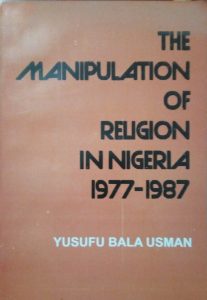“All these clamours aim at redress. But a clamour made merely at rendering the people discontented with their situation, without an endeavour to give them a practical remedy, is indeed one of the worst forms of sedition”, The Honourable Edmund Burke, 1729-1797
This series of articles recall and celebrate the intellectual struggles of my teacher and mentor, the late Dr. Yusuf Bala Usman, to expose the insidious tendencies that have ranged themselves against the very existence of Nigeria and what she represents in the larger African and Black Diaspora contexts. The misrepresentation of Nigeria has been at the heart of this subterfuge for long, and a consistent endeavour that has been conducted mainly by a section of the elite of this country to the point that today it has become a sedition.
This is being done at every opportunity and under every circumstance. The main purpose of this endeavour is to erode the country’s credibility and integrity as a nation and ultimately, bring about its demise. The stereotyping of Nigeria and the heightening of negative reportage about happenings within the country have conditioned many Nigerians to believe that their country is fragile and tittering on the brink.
They have especially become cynical toward the idea that Nigeria has a destiny and must become a successful bastion of Black civilization, with a mission to advance the ideals of equality of nations, peoples and races. A sense of futility has been cultivated in Nigerians regarding the viability of their country as a result of this incessant down-grading of the country.

The late Yusuf Bala Usman
The constant denigration of the country has led to the belief that it is impossible to realise any positive results from an attachment to Nigeria, such as achieving stability and higher standards of life for the majority of its people and others in Africa. The misrepresenters of Nigeria see as the purpose of their lives the creation of ethno-religious enclaves over which they seek to rule to the exclusion of others whom they see as “aliens” and therefore; not part of their “nations”.
This tendency has been going on since the independence of the country and has become intensified in recent years as a result of economic factors and the desultory way and manner governance has been conducted and politics has been played out in Nigeria.
The misrepresentation of Nigeria is conducted on two broad fronts, one on the home front and the other from outside the shores of the country. Both aim to achieve one and the same outcome, namely the dissolution of the country altogether by means that are fraught with excuses based on “unbridgeable religious differences” and “evident ethnic incompatibilities”.
To achieve this objective, the instigators rely on the exploitation of sentiments and corrupting of public opinion. Their tactic is to alienate the people from their government thereby bringing down the edifice of the state and creating conditions towards the collapse of the country. The aim therefore, is to deprive government of the legitimacy without which it would cease to thrive and function and thus, bring about general discontent and unrest in the country.
The British statesman and political thinker, the Honourable Edmund Burke, had reflected carefully on the causes of tumults and distempers in his country during several years of parliamentary life and philosophical reflections. One element that stood out in his thoughts was the manipulation of sentiments against authorities in the advancement of causes of discontent.
Burke rightly noted, “As all government stands on opinion, they know that the way utterly to destroy it is to remove that opinion, to take away all relevance, all confidence from it, and then, at the first blast of popular discontent and public tumult, it tumbles to the ground”.
The agitators have not succeeded in bringing Nigeria down yet, but they are succeeding in creating tumult and discontent, and are actively and assiduously fomenting a state of unrest and agitation by discrediting government in all its aspects, and by substituting stability with anarchy and disorder everywhere.
They are chipping away at the edifice of the country especially its constitution and state structures, to the point that today, indispensable exercises of governance like passing of legislations, the conduct of national elections and population and housing census, the location of national projects etc, cannot be done without serious challenges to their validity and integrity from the ready-made opponents of Nigeria.
The just concluded general elections and the national population and housing census that has been postponed, have brought the underlying factors that are used to cause instability in Nigeria to the surface. Up front, even before its commencement, the census was condemned and warnings about the inherent perils in its execution were loudly proclaimed, just so as to create tension around it, as it was the case in the earlier exercises in the country in the 1960s.
Even though it has been postponed, criticisms and denunciation of the census are still being expressed, adding to the challenges being posed to the country’s authorities. With regard to the recent general elections, the discontents and clamour around it were unprecedented and vociferous. Even before the results were counted, collated and declared, stiff opposition and the stoking of the embers of sectional, religious and ethnic chauvinism were conducted by certain parties and actors, who deemed it their right to cause tumult and create tension in the country.
 The 2023 elections especially heightened sentiments against the unity of Nigeria more than at any other occasion in recent years. The announcement of the winner of the presidential election particularly became a hotly contested issue to the point that the forces of sectionalism and disorder actually called for the military to truncate the democratic system in the country and introduce an “interim” government of sorts.
The 2023 elections especially heightened sentiments against the unity of Nigeria more than at any other occasion in recent years. The announcement of the winner of the presidential election particularly became a hotly contested issue to the point that the forces of sectionalism and disorder actually called for the military to truncate the democratic system in the country and introduce an “interim” government of sorts.
An event no less significant than saving Nigerians’ lives and getting them out of harms way could not gather national consensus simply because of the attitudinal fragmentation that has been introduced into our national discourses by the opponents of progress in Nigeria.
The evacuation of Nigerian students from the Sudan necessitated by the conflict in that country, has been used as one more excuse to denigrate Nigeria and debase the image of the government. Persons who ought to know better allowed their anti-government sentiments to overwhelm them and to lump circumstance with opportunities to conduct a spontaneous campaign of vilification against Nigeria and in so doing, portrayed the country as inherently inept, corrupt and a fumbling disgrace.
Questioning the validity of every governmental exercise has become a habit, and challenging the powers of the state is now an obligatory duty of some people around Nigeria. Using both the pulpit and the rostrum as ready platforms, the legitimacy of not only the government, but the very survival of the country itself, were constantly called into question. Threats to dissolve the country were issued and separation became the mantra for some.
Every opportunity no matter how grave or trivial, every excuse no matter how sober or dramatic and every idea no matter how relevant or inconsequential, is exploited maximally to this very end. Aided and abetted by both internal actors and foreign interests, this tendency has been so actively embraced by its practitioners that it has now become their raison d’etre and a lifetime obsession.
To bring down Nigeria as noted earlier, is their first objective. This is consistent with their idea that Nigeria is a “contraption” that was artificially put together by an alien power, the British, without the consent of the people or nationalities involved. This ahistorical standpoint has continued to govern the sentiments and shape the attitudes of the agitators, despite the evidences that are opposed to them drawn from universal history and the inexorable march of time.
All nations are “contraptions” so to speak, that have been knocked together by diligent men and women, not necessarily with the consent of the peoples involved, but by the force of circumstances as dictated by their respective histories. There is no nation or country on earth that is not an artificial creation born out of expedience or the desire by people to live in a community of identical aspirations and purposes.
Singling out Nigeria as a “contraption” on the basis of which to seek its dissolution is the highest form of negation of historical realities and the deliberate ignoring of the inexorable progress of societies towards the common goal of aggregation. Whether the British had been here or not, at one point or the other in history, the communities that form Nigeria today would have come together one way or the other, perhaps in a different framework but almost along the lines of their current constellation.
The fact that Nigeria was created by an alien colonial power does not detract from the process of state formation and consolidation which has been the hallmark of the widespread economic changes that have been introduced by the industrial revolution in the 19th century.
The economic necessity of consolidation of communities to become an aggregated production system is the inherent characteristic of the formation of colonial states as carried out by the Europeans in Africa as well as in Asia and Latin America at much earlier periods in history. The colonization of territories and their consolidation into nations were acts of convenience and also of necessary expedience.
Such acts started in Europe first, and then were extended to the colonial possessions of the nineteenth century European powers that took over territories in Africa but much earlier in Latin America and Asia as well. State formation and the galvanisation of such territories became a fait accompli with their incorporation into the emerging global capitalist system.
The inevitability of this process led to the inexorable transformation of the colonized societies within a matter of generations, leading to the blurring of primordial identities and subsuming of hitherto autochthonous enclaves wherever they existed, within the larger milieu of the new order. Citing ethnic and religious reasons to remodel a country that was essentially created as part of a global hegemonic colonial enterprise, is both fallacious and an escape from reality.
Self-determination in this day and age must not be around ethnic identities or enclaves but essentially around socio-economic relationships and the ownership of the means of production in the country, that should be dictated by the forms of appropriation that have been established around basic economic tenets.
The resort to ethnicity is a cheap and convenient way to localise wider grievances that are actually common to all the constituent parts of the Nigerian nation, which are aggravated by their alienation from access to economic benefits and from being part of the larger production and appropriation process.




























